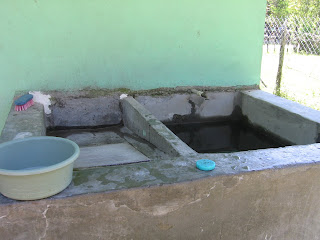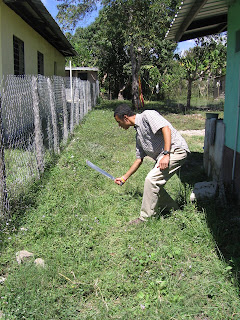
Washing Machine

Lawn Mower

Hot Water Heater
Our “washing machine” is called a pila and it holds gallons and gallons of water that are used for more than just washing clothing. We are fortunate enough to have water every day, but we only have it for a few hours each day. Therefore, when we don’t have running water, we use our pila water to wash dishes, flush our toilet, water our plants, bathe, clean the floors, and anything else one might use water for. For those who have never flushed their toilet with anything other than that convenient lever, you can do it by pouring about a liter of water all at once straight down the hole. Due to some sort of miracle of physics, you can flush the toilet that way.
Our “lawn mower” is one of us – in this case, Dan – with a machete. Cutting grass and weeds with a machete is much more labor intensive than using the old-fashioned push-mower that I grew up using. You have to bend your knees to get as close to the ground as possible so that your machete hits the grass at the right angle. It takes numerous swipes from different directions, because some of the grass will lay flat when hit by the machete (kind of like shaving when you’re days overdo).
Our “hot water heater” is, indeed, a large pot on a one-burner stove. Whenever one of us would like to take a warm bucket bath, we heat pila water for 15-20 minutes, pour it into a metal tub we have in our shower and then add cold water until the water reaches the right temperature. Then we use a little paila (plastic bowl like the one sitting on the pila in the picture) to pour warm water on ourselves before soaping up. It’s a much longer process than simply turning a tap and hopping into the shower, but it produces similar results.
Recycling has also taken on a new meaning for us since there are no lovely green bins to put soup cans and pop bottles into to be picked up on Thursday mornings. An example of this is that our watering can is a recycled 3 liter pop bottle with holes cut in the top (as the saying goes: Necessity is the mother of invention). To water our plants, we simply fill it ¾ of the way up, put the cap on, and turn it upside down. We are also saving up soup cans to bake banana bread in (which should work, according to the Oregonian Food Day article my mom sent) so that we can share with our neighbors who are always giving us fruit, tamales, and tortillas to try.
